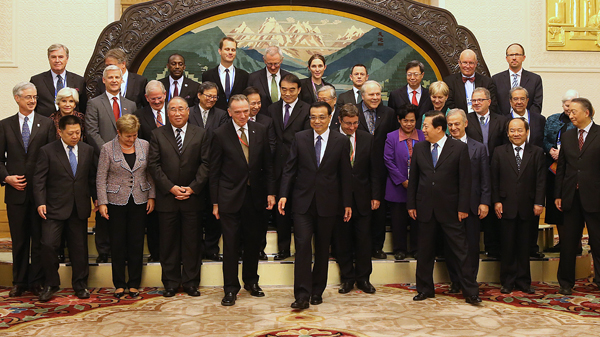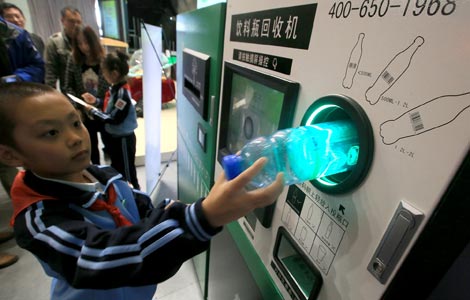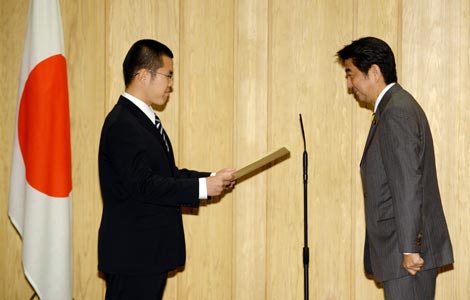Green chance offered to investors
Updated: 2013-11-15 00:20
By ZHAO YINAN and WANG QIAN (China Daily)
|
||||||||
We hope China's energy conservation products will enter overseas market: Li
 |
|
Premier Li Keqiang meets foreign representatives attending the annual general meeting of the China Council for International Cooperation on Environment and Development in Beijing on Thursday. Photo by Xu Jingxing / China Daily |
China will open its energy conservation and environmental protection industry to international investors, Premier Li Keqiang said on Thursday.
The industry has huge market potential in China, he said, and is capable of being developed into a pillar industry.
"We encourage private capital to enter the field. We also hope China's energy conservation and environmental protection products will enter the overseas market, and we will open the industry to the international market," the premier said.
Li made the remarks when meeting delegates to the 2013 annual meeting of the China Council for International Cooperation on Environment and Development in Beijing.
The three-day meeting, which ends on Friday, is being held immediately after the Third Plenum of the Communist Party of China's 18th Central Committee, which ended on Tuesday.
A communique released after the Party meeting said a sound system to protect the ecological environment will be established.
NanoH2O Inc, with headquarters in California and which makes reverse osmosis membranes — core materials used in water desalination — said in late October that it will set up a desalination plant with investment of 45 million yuan ($7.4 million) in Liyang, Jiangsu province, next year.
It will be the biggest investment the company has made abroad. Jeff Green, its founder and chief executive officer, said he expects the latest products to enter the emerging Chinese market.
He estimates that China's water desalination market will be worth 6 billion yuan by 2020 and that at least 100 million people in the country will be drinking desalinated water by then.
Li said China's economy can maintain sustainable and healthy development only through upgrading and restructuring.
As people's need for a quality environment rises, environmental protection has become a prominent issue in improving livelihoods, he said.
Li also said the government has promised to delegate its power to create an environment for enterprises to compete on equal terms.
"We also stressed that supervision of anti-pollution efforts should be conducted in an open and transparent manner," he said.
The central government has called for strict punishment for enterprises causing pollution.
In September, the government also released an action plan to reduce air pollution.
Peter Kent, executive chairman of the council for international cooperation, and former minister of the environment in Canada, said it is very timely to hold the meeting straight after the Third Plenum, which announced reforms in the social, economic and environmental sectors.
He said he is impressed by the action plan on pollution and expects similar plans to be drafted to tackle soil and water pollution.
Kristalina Georgieva, European Commissioner for International Cooperation, Humanitarian Aid and Crisis Response and member of the council, hailed the Third Plenum's decision to acknowledge the "decisive role" of the market in allocating resources.
Reforms proposed
China's minister of environmental protection has pledged that tackling air, water and soil pollution will be a top priority for the government in the next five years.
"Besides the clean air action plan, we will draw up action plans to clean water and protect soil from contamination," Zhou Shengxian said at the opening ceremony of the annual meeting on Wednesday.
He said the Third Plenum has called for reform of the system to protect the ecological environment.
"The focus of the reform is to establish a national pollutant discharge monitoring system under independent supervision and law enforcement," he said.
The nation will also set up a regional cooperation system to tackle pollution and recover the bio-environment.
The timely release of environmental information, and improving the pollution reporting system are also vital to strengthening public participation and social supervision, Zhou said.
Ma Zhong, dean of Renmin University of China's School of Environment and Natural Resources, said the communique released after the plenum sent a good signal on environmental protection.
Yang Fuqiang, senior adviser on climate and energy policy at the Natural Resources Defense Council, said natural resources must be managed by the government and be paid for by exploration, which can avoid overexploitation of natural resources, especially valuable minerals such as rare earths.
Zhou said environmental protection in China is facing unprecedented challenges and it is time to make a change.
Contact the writers at zhaoyinan@chinadaily.com.cn and wangqian@chinadaily.com.cn

 US carrier starts Philippine storm relief
US carrier starts Philippine storm relief
 Treasures under the hammer
Treasures under the hammer
 'Reverse' vending machine sells idea of recycling
'Reverse' vending machine sells idea of recycling
 Heroic act helps thaw icy ties
Heroic act helps thaw icy ties
 Newtown families mark anniversary with a plea for parents to unite
Newtown families mark anniversary with a plea for parents to unite
 China's changing fashion since 1978
China's changing fashion since 1978
 Healthy baby born to brain-dead mom in Hungary
Healthy baby born to brain-dead mom in Hungary
 Top 10 romantic places to meet your Miss Right
Top 10 romantic places to meet your Miss Right
Most Viewed
Editor's Picks

|

|

|

|

|

|
Today's Top News
China issues detailed reform roadmap
CCNY to occupy US's tallest building
Nobel prize winner's connections with China
US to seek commitment on market
 CCA buys on Hudson riverfront
CCA buys on Hudson riverfront
US treasury chief visits China
US spying agencies out of control
Yancoal strides into the potash game
US Weekly

|

|







